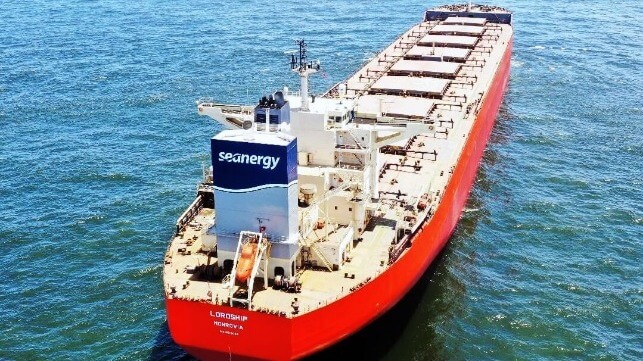Seanergy Provides Vessel to Demonstrate Hydrogen Power Retrofit

Greek dry bulk shipping company Seanergy Maritime will be providing a vessel to work as the test bed and demonstration vessel for a new European Union co-funded project to develop and demonstrate the safety and viability and accelerate the adoption of Sustainable Alternative Fuels (SAFs) in waterborne transport. The project recently held its kickoff meeting as it began a four-year effort, 48 months, to develop the technologies to employ alternative fuels on existing vessels.
Seanenergy which is a pure-play Capesize shipowner highlights that it is the first Greek shipping company to be selected to participate in a pioneering project of this scope. The company, which operates a fleet of 16 Capesize and one Newcastlemax bulkers, will provide one of its existing, conventionally fueled vessels as the demonstration ship for the project.
The company’s bulker will be retrofitted to utilize hydrogen (H2) as its main energy source for electric power generation. According to the company, the system is also expected to cover a portion of the vessel's propulsion requirements and, therefore, to reduce reliance on conventional fuels.
The strategic partnership with the European Union and key industry stakeholders is another major achievement of our company towards our global ESG objectives,” said Stamatis Tsantanis, the company’s Chairman & Chief Executive Officer. “This prominent combination of world-renowned stakeholders consists of classification societies, engineering and industrial firms, the academic community, as well as the European Union. Our collaborative approach will actively contribute to the development of green solutions for the existing fleet, revealing solutions that have an immediate impact.”
Known as the SAFeCRAFT Project Consortium (Safe and Efficient Use of Sustainable Fuels in Maritime Transport Application), the initiative focuses on the utilization of alternative fuels. The project will focus on demonstrating four technologies, acting as SAF enablers for different types of ocean-going and short-sea shipping vessels, both newbuilding and retrofits. Among the areas they will work with are H2 (Dihydrogen), liquid hydrogen, compressed hydrogen, and ammonia and other liquid organic hydrogen carriers, all of which have the potential to become sustainable alternative fuels.
The project calls for physical demonstrations of the groundbreaking technology and its application to the existing maritime fleet. Seanergy reports it will oversee the feasibility study and retrofitting of the equipment aboard its vessel along with the other project partners.

that matters most
Get the latest maritime news delivered to your inbox daily.
The project includes a total of 11 partners including the classification and consulting companies American Bureau of Shipping and RINA Services. There are also engineering and industrial fuel companies as well as academic participation from the University of Strathclyde in Scotland, the University of Paras in Greece, and the Dresden University of Technology in Germany.
The consortium partners are co-funding the project with the European Union. It seeks to align with the goals of the “Horizon Europe” program and the FuelEU Maritime 2040 targets by demonstrating technologies to achieve a 26 percent reduction in CO2 emissions for an existing vessel.
